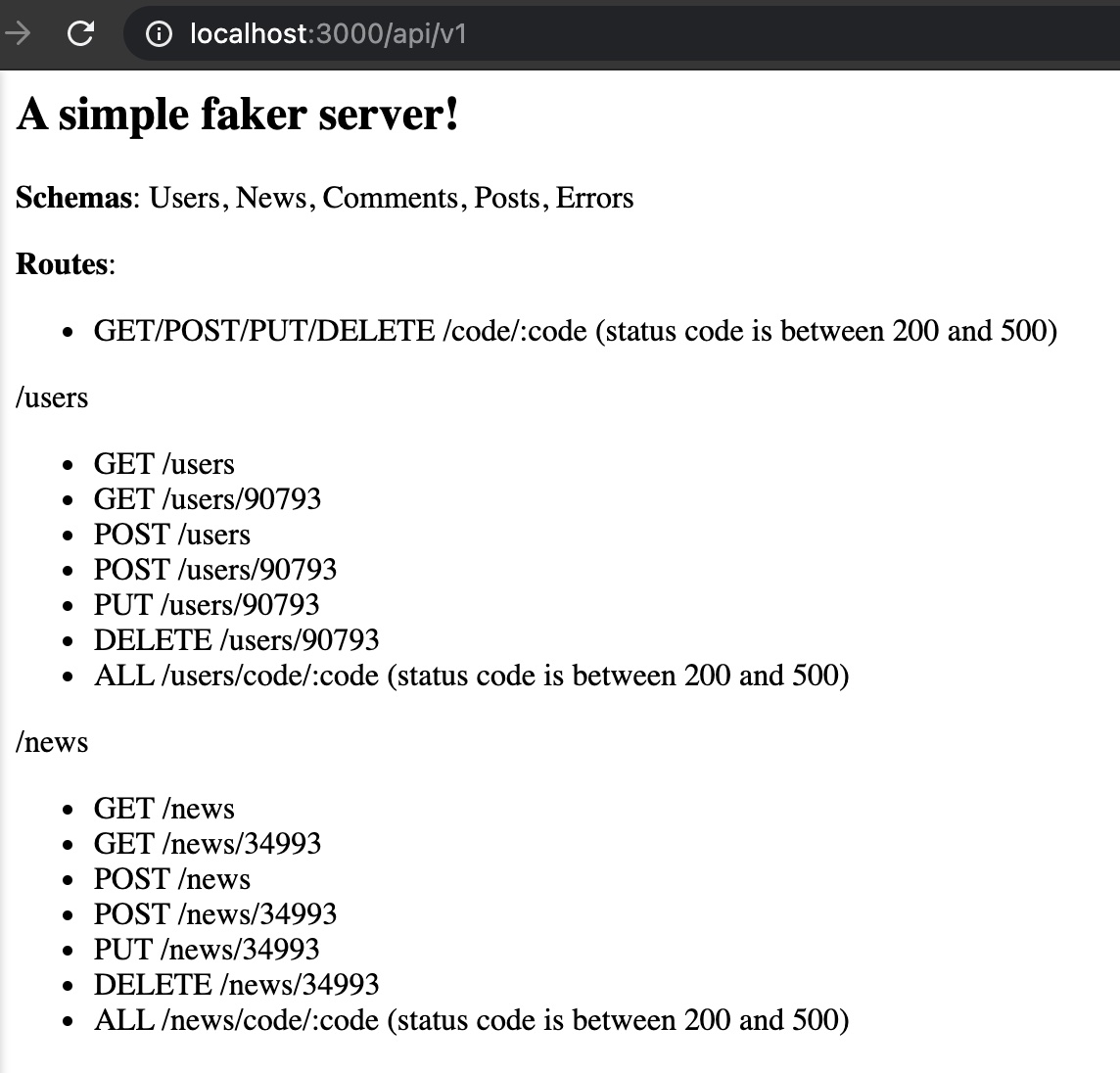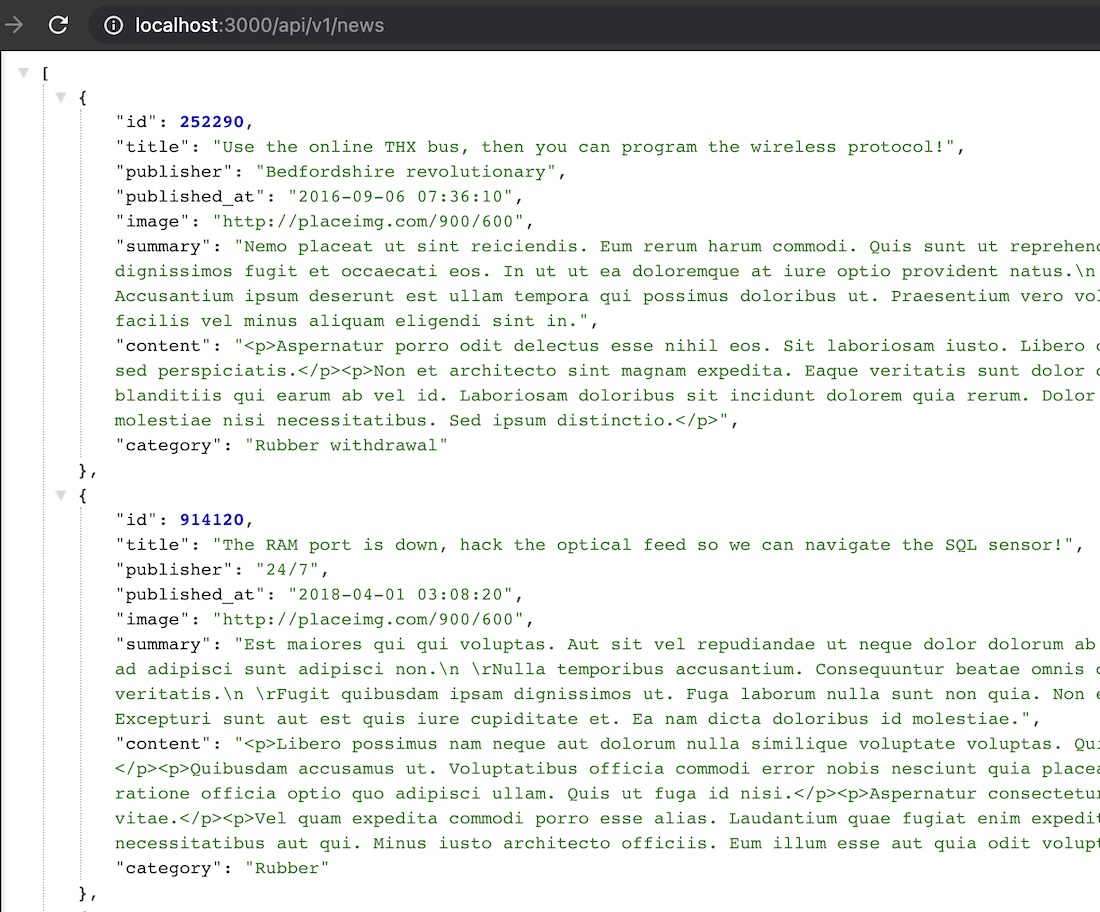schema-faker
schema-faker generates massive amount of json fake data with zero coding, based on data type and json schema.
It is also built with a simple faker server to serve mockup REST API.
schema-faker uses faker.js to generate fake data.
const faker = new SchemaFaker(); // The default locale is en, data length is 10
faker.fake("integer"); // return a number
faker.fake("html"); // return html paragraphs
faker.fakeSchema({
id: "integer",
username: "username(6,20)",
email: "email",
profile: {
first_name: "name.firstName",
last_name: "name.lastName",
about: "Hello! I'm living in {{address.cityName}} with 2 kids and 1 {{animal.dog}}.",
},
}); // return fake object with the defined schema$ yarn fake-server -b /api/v1 schema.json
The simple faker server is running at http://localhost:3000/api/v1To create a custom mockup API server
const path = require("path");
const express = require("express");
const { SchemaFaker, fakeRouter } = require("schema-faker");
const mockup = fakeRouter(path.resolve(__dirname, "schema.json"), {
locale: "de",
});
const server = express();
server.use("/mockup/api", mockup); // simply use schema-faker's mockup router
server.get("/:locale/other-fake-api", (req, res) => {
const len = req.query.length || 10;
const faker = new SchemaFaker(req.params.locale, len);
const data = faker.fakeApi({ prop: otherSchema });
res.json(data.prop);
});
// ...Getting started
Install schema-faker
# Using yarn
yarn add --dev schema-faker
# Using npm
npm install --save-dev schema-fakerTypescript usage
import { SchemaFaker } from "schema-faker";Javacript usage
const { SchemaFaker } = require("schema-faker");const faker = new SchemaFaker(); // The default locale is en, data length is 10
// const faker = new SchemaFaker("ja", 20);
faker.fake("integer"); // return a number
faker.fake("integer(10,99)"); // return 2 digits number
faker.fake("html"); // return html paragraphs
faker.fake("html(3,6"); // return html with paragraphs number is from 3 to 6
const userSchema = {
id: "integer",
username: "username(6,20)",
email: "email",
first_name: "name.firstName",
last_name: "name.lastName",
password: "password",
last_login: "datetime",
gender: "gender",
profile: {
first_name: "name.firstName",
last_name: "name.lastName",
about: "Hello! I'm living in {{address.cityName}} with 2 kids and 1 {{animal.dog}}.",
bio: "html(2,5)",
},
};
faker.fakeSchema(userSchema); // return fake object with the defined schema
faker.fakeApi({
Users: userSchema,
Posts: {
id: "integer(100000,999999)",
author: "username(5,30)",
content: "html(4,7)",
summary: "lorem.paragraphs(2,3)",
created_at: "datetime",
published: "boolean",
tags: ["words(1,2)", "animal.type"],
},
});
/**
* return json-server compatible mockup json
* Data length of each data set is defined when initialized with new SchemaFaker(locale, dataLength)
* {
* "Users": [
* {
* "id": ...
* "username": ...
* ...
* },
* {
* "id": ...
* "username": ...
* ...
* }
* ],
* "Posts": [
* {
* "id": ...
* "author": ...
* ...
* },
* {
* "id": ...
* "author": ...
* ...
* }
* ],
* ]CLI fake-server usage
With the cli fake-server, you can simply create a mock REST API with zero coding.
Firstly, create a schema.json file with content is as same as the schema passed to faker.fakeApi(schema).
Please refer to the sample schema: schema.json.
# fake-server requires express
yarn add --dev express
# using npm
# npx fake-server --help
yarn fake-server --help
fake-server [options] <schema json file>
Options:
--help Show help [boolean]
--version Show version number [boolean]
-n, --length The length of each generated data set [default: 10]
-l, --locale The locale (eg. "ja", "de") [default: "en"]
-p, --port Set port [default: 3000]
-h, --host Set host [default: "localhost"]
-b, --base Set base url (e.g. /v2 or /api) [default: ""]
yarn fake-server -b /api/v1 schema.json
// The simple faker server is running at http://localhost:3000/api/v1Now if you go to http://localhost:3000/api/v1/users or http://localhost:3000/api/v1/users/10346, you'll get your fake users.
CLI fake-data usage
If you just want to generate fake data to use it by your own way, please use the cli fake-data. For example, you can use json-server to serve your fake data.
yarn fake-data --help
fake-data [options] <schema json file>
Options:
--help Show help [boolean]
--version Show version number [boolean]
-n, --length The length of each generated data set [default: 10]
-l, --locale The locale (eg. "ja", "de") [default: "en"]
-o, --output Write faked data to file [default: ""]
yarn fake-data -o mockupdb.json schema.json
# for example, use json-server to serve mockupdb.json
yarn add --dev json-server
json-server mockupdb.jsonData Types
Basic Types
const faker = new SchemaFaker("en", 10); // The default locale is en, data length is 10
// const faker = new SchemaFaker();
// const faker = new SchemaFaker("ja", 20);
faker.setLocale("de"); // change locale after initialized
faker.setLength(15); // change data length after initialized
const min = 10;
const max = 99;
faker.fakeInteger(min, max); // return 2 digits number
faker.fake("integer(10,99)"); // same as above
faker.fakeString(min, max); // return a string whose length between min and max.
faker.fake("string(10,99)"); // same as above
faker.fake("float(10,99)"); // same as faker.fakeFloat(10,99)
faker.fake("boolean"); // same as faker.fakeBoolean()
faker.fake("date"); // format yyyy-mm-dd
faker.fake("time"); // format h:i:s
faker.fake("datetime"); // format yyyy-mm-dd h:i:s
faker.fake("image"); // return a fake image url
faker.fake("name"); // return a fake full name
faker.fake("username(6,20)"); // return a fake alphanumeric string whose length is from 6 to 20
faker.fake("html(2,4)"); // return a fake html paragraphs with number of paragraphs is between 2 to 4faker.js Types
schema-faker supports all types from faker.js
Usage: faker.fake(${type}) or faker.fake(${group}.${type}).
With some specific types which have one numeric argument, such as words, paragraphs, you can use the following api:
faker.fake(`typename(${min},${max})`)
faker.fake(`group.typename(${min},${max})`)Basically, schema-faker will try to find all grand-children properties of faker.js, it will call faker.js if there is any grand-child properties found. schema-faker also supports faker.js' mustache format.
faker.fake("address.city"); // same as faker.js's faker.address.city()
// schema-faker is smart to find city is property of address
faker.fake("city"); // same as faker.js's faker.address.city()
faker.fake("lorem.words(2,5)"); // same as faker.js's faker.lorem.words(n) with 2 <= n <= 5
// schema-faker is smart to find words is property of lorem
faker.fake("words"); // same as faker.js's faker.lorem.words()
faker.fake("{{name.lastName}} {{name.firstName}} lives in {{address.country}}");Schema and API
By using fakeSchema and fakeApi, you can simply generate massive amount of json data for mockup REST API. Further more, you can fake schema nested by other schema.
const otherSchema = {id: "integer(1000,9000)", message: "phrase"};
const accountSchema = {
message: "{{name.lastName}} {{name.firstName}} lives in {{address.country}}",
money: "{{finance.amount}} millions USD",
crypto: "finance.bitcoinAddress",
nested: {
prop1: "phrase", // schema-faker knows that phase belongs to hacker.phrase
tags: ["word", "words(2,2)"],
comments: [
{commentId: "integer(1000,9999)", comment: "html(1,3)"},
{commentId: "integer(100000,999999)", comment: "html(2,4)"}
],
other: otherSchema
}
};
faker.fakeSchema(accountSchema);
faker.fakeApi({
"Users": userSchema,
"Posts": {
"id": "integer",
"ref": otherSchema,
"tags": ["word", "words(2,2)"],
"comments": [otherSchema, otherSchema, otherSchema]
},
"Accounts": accountSchema
});Custom Types
You can easily add your own custom type, and then define it in your schema. All type names are case-insensitive.
const categories = [
faker.fake("string(6, 10)"),
faker.fake("name"),
faker.fake("words(2,3)"),
];
faker.addType("MyTax", () => {
return faker.fakeInteger(1000,5000) * 21 / 100;
});
faker.addType("MyAccountSummary", (i,j) => {
const rand = i + j;
return "Debit: " + faker.fake("finance.amount") + " / Credit: " + rand.toString();
});
faker.addType("MyCategory", () => {
return categories[faker.fakeInteger(0, categories.length - 1)];
});
faker.fake("MyCategory");
faker.fakeApi({
"News": {
"id": "integer",
"title": "hacker.phrase",
"content": "html(5,8)",
"category": "mycategory", // great, I can add my own customized type
},
"Salaries": {
"net": "integer(100000,120000)",
"category": "mycategory", // great, I can add my own customized type
"summary": "MyAccountSummary(500, 1000)", // type name is case-insensitive
"tax": "mytax" // wow, I can use as many customized types as I can
}
});Your Custom Mockup API Server
Your Custom Next.js Server
Developing a frontend app requires an API server, yet dealing browser CORS issue is troublesome. You can create your own custom Next.js server built with schema-faker to serve both frontend and (mockup) backend.
const path = require("path");
const next = require("next");
const express = require("express");
const { SchemaFaker, fakeRouter } = require("schema-faker");
const mockup = fakeRouter(path.resolve(__dirname, "schema.json"), {
locale: "de",
});
const port = process.env.PORT || 3000;
const app = next({ dev: true });
const handle = app.getRequestHandler();
app
.prepare()
.then(() => {
const server = express();
const otherSchema = { id: "integer", message: "lorem.sentence" };
server.use("/mockup/api", mockup); // simply use schema-faker's mockup router
server.get("/:locale/other-fake-api", (req, res) => {
const len = req.query.length || 10;
const faker = new SchemaFaker(req.params.locale, len);
const data = faker.fakeApi({ prop: otherSchema });
res.json(data.prop);
});
server.all("*", (req, res) => {
return handle(req, res);
});
server.listen(port, (err) => {
if (err) throw err;
console.log(
`> Fake Server for Next.js is ready on http://localhost:${port}`
);
});
})
.catch((err) => {
console.log("Error:::::", err);
});API Methods
Fake Methods
- fake: faker.fake(dataType) to fake a single data type
- fakeSchema: faker.fakeSchema(objectType) to fake a whole object
- fakeApi: faker.fakeApi(apiSchema) to run mockup json-server
Data Types List
You can define your schema type with any type from the following types.
// schema.json
{
"Api1": {
"prop": "type",
"prop": "type(min,max)"
},
"Api2": {
"prop": "type",
"prop": "group.type",
"prop": "group.type(min,max)"
}
}-
integer
-
float
-
boolean
-
string
-
date
-
time
-
datetime
-
image
-
name
-
username
-
html
-
random.number
-
random.float
-
random.arrayElement
-
random.arrayElements
-
random.objectElement
-
random.uuid
-
random.boolean
-
random.word
-
random.words
-
random.image
-
random.locale
-
random.alpha
-
random.alphaNumeric
-
random.hexaDecimal
-
helpers.randomize
-
helpers.slugify
-
helpers.replaceSymbolWithNumber
-
helpers.replaceSymbols
-
helpers.replaceCreditCardSymbols
-
helpers.repeatString
-
helpers.regexpStyleStringParse
-
helpers.shuffle
-
helpers.mustache
-
helpers.createCard
-
helpers.contextualCard
-
helpers.userCard
-
helpers.createTransaction
-
name.firstName
-
name.lastName
-
name.middleName
-
name.findName
-
name.jobTitle
-
name.gender
-
name.prefix
-
name.suffix
-
name.title
-
name.jobDescriptor
-
name.jobArea
-
name.jobType
-
address.zipCode
-
address.zipCodeByState
-
address.city
-
address.cityPrefix
-
address.citySuffix
-
address.cityName
-
address.streetName
-
address.streetAddress
-
address.streetSuffix
-
address.streetPrefix
-
address.secondaryAddress
-
address.county
-
address.country
-
address.countryCode
-
address.state
-
address.stateAbbr
-
address.latitude
-
address.longitude
-
address.direction
-
address.cardinalDirection
-
address.ordinalDirection
-
address.nearbyGPSCoordinate
-
address.timeZone
-
animal.dog
-
animal.cat
-
animal.snake
-
animal.bear
-
animal.lion
-
animal.cetacean
-
animal.horse
-
animal.bird
-
animal.cow
-
animal.fish
-
animal.crocodilia
-
animal.insect
-
animal.rabbit
-
animal.type
-
company.suffixes
-
company.companyName
-
company.companySuffix
-
company.catchPhrase
-
company.bs
-
company.catchPhraseAdjective
-
company.catchPhraseDescriptor
-
company.catchPhraseNoun
-
company.bsAdjective
-
company.bsBuzz
-
company.bsNoun
-
finance.account
-
finance.accountName
-
finance.routingNumber
-
finance.mask
-
finance.amount
-
finance.transactionType
-
finance.currencyCode
-
finance.currencyName
-
finance.currencySymbol
-
finance.bitcoinAddress
-
finance.litecoinAddress
-
finance.creditCardNumber
-
finance.creditCardCVV
-
finance.ethereumAddress
-
finance.iban
-
finance.bic
-
finance.transactionDescription
-
image.image
-
image.avatar
-
image.imageUrl
-
image.abstract
-
image.animals
-
image.business
-
image.cats
-
image.city
-
image.food
-
image.nightlife
-
image.fashion
-
image.people
-
image.nature
-
image.sports
-
image.technics
-
image.transport
-
image.dataUri
-
lorem.word
-
lorem.words
-
lorem.sentence
-
lorem.slug
-
lorem.sentences
-
lorem.paragraph
-
lorem.paragraphs
-
lorem.text
-
lorem.lines
-
hacker.abbreviation
-
hacker.adjective
-
hacker.noun
-
hacker.verb
-
hacker.ingverb
-
hacker.phrase
-
internet.avatar
-
internet.email
-
internet.exampleEmail
-
internet.userName
-
internet.protocol
-
internet.httpMethod
-
internet.url
-
internet.domainName
-
internet.domainSuffix
-
internet.domainWord
-
internet.ip
-
internet.ipv6
-
internet.port
-
internet.userAgent
-
internet.color
-
internet.mac
-
internet.password
-
database.column
-
database.type
-
database.collation
-
database.engine
-
phone.phoneNumber
-
phone.phoneNumberFormat
-
phone.phoneFormats
-
date.past
-
date.future
-
date.between
-
date.betweens
-
date.recent
-
date.soon
-
date.month
-
date.weekday
-
time.recent
-
commerce.color
-
commerce.department
-
commerce.productName
-
commerce.price
-
commerce.productAdjective
-
commerce.productMaterial
-
commerce.product
-
commerce.productDescription
-
system.fileName
-
system.commonFileName
-
system.mimeType
-
system.commonFileType
-
system.commonFileExt
-
system.fileType
-
system.fileExt
-
system.directoryPath
-
system.filePath
-
system.semver
-
git.branch
-
git.commitEntry
-
git.commitMessage
-
git.commitSha
-
git.shortSha
-
vehicle.vehicle
-
vehicle.manufacturer
-
vehicle.model
-
vehicle.type
-
vehicle.fuel
-
vehicle.vin
-
vehicle.color
-
vehicle.vrm
-
vehicle.bicycle
-
music.genre
-
datatype.number
-
datatype.float
-
datatype.datetime
-
datatype.string
-
datatype.uuid
-
datatype.boolean
-
datatype.hexaDecimal
-
datatype.json
-
datatype.array





